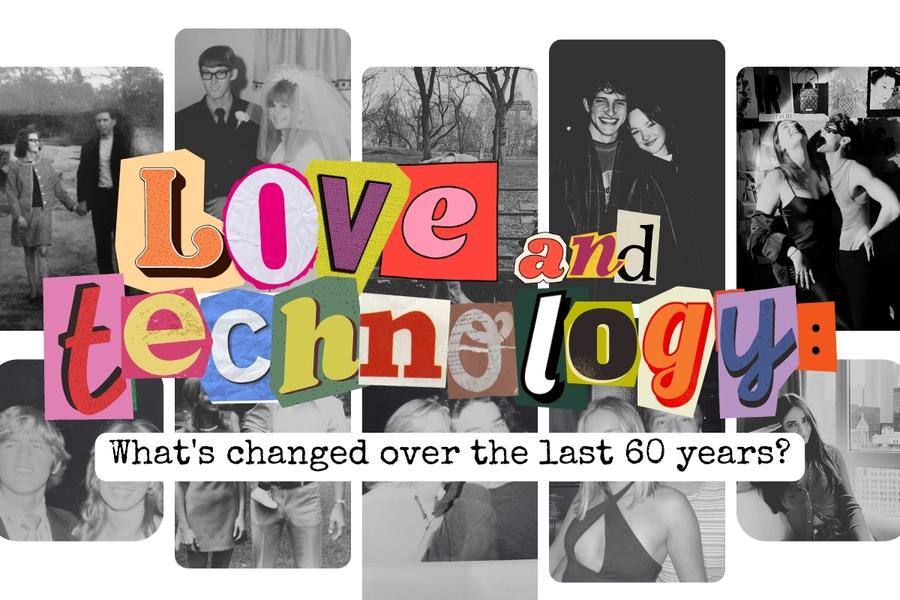I have friends who claim they were born in the wrong time, or the wrong generation. They say that life was better back when our parents, or grandparents even, were growing up. When I first heard that (and I’ve heard it many times from many people since) I thought it sounded entirely pretentious, an adaptation of the whole “grass is greener on the other side” metaphor. Or, put more simply–you always want what you can’t have.
I can’t say that I’m immune to these same rose-colored glasses perceptions. When I think of what life must’ve been like in times since passed, I wonder about love back then too. I’m not sure the two are mutually exclusive (I think it depends on who you ask).
Maybe it’s the hopeless romantic in us that glorifies times long gone, back when love seemed to be electric, unexpected, and most notably, face to face. Maybe there is a sort of magic in the simplicity of meeting someone organically, like in the movies. Maybe it’s an illusion perpetuated by the slow fade of human connection against the backdrop of a surge in technological innovation.
What if we turned back time, what trends would we see in what has since changed, or stayed the same? The more I dig the more I wonder, are those of us who grew up alongside technology being cheated? Are the cards stacked against us in our pursuit of love? Is it only time who will tell all?
In pursuit of answers to these questions (as philosophical and existential as they may be), I spoke with people from three different generations–Baby Boomers, Generation X, and finally, Generation Z. I asked them about their experiences with love and how they feel about technology’s role in changing societal norms surrounding it.
What I found surprised me, made me laugh, made me cry, and confirmed some of my intuitions while rejecting many of my preconceived notions. How’s that for a paradox?
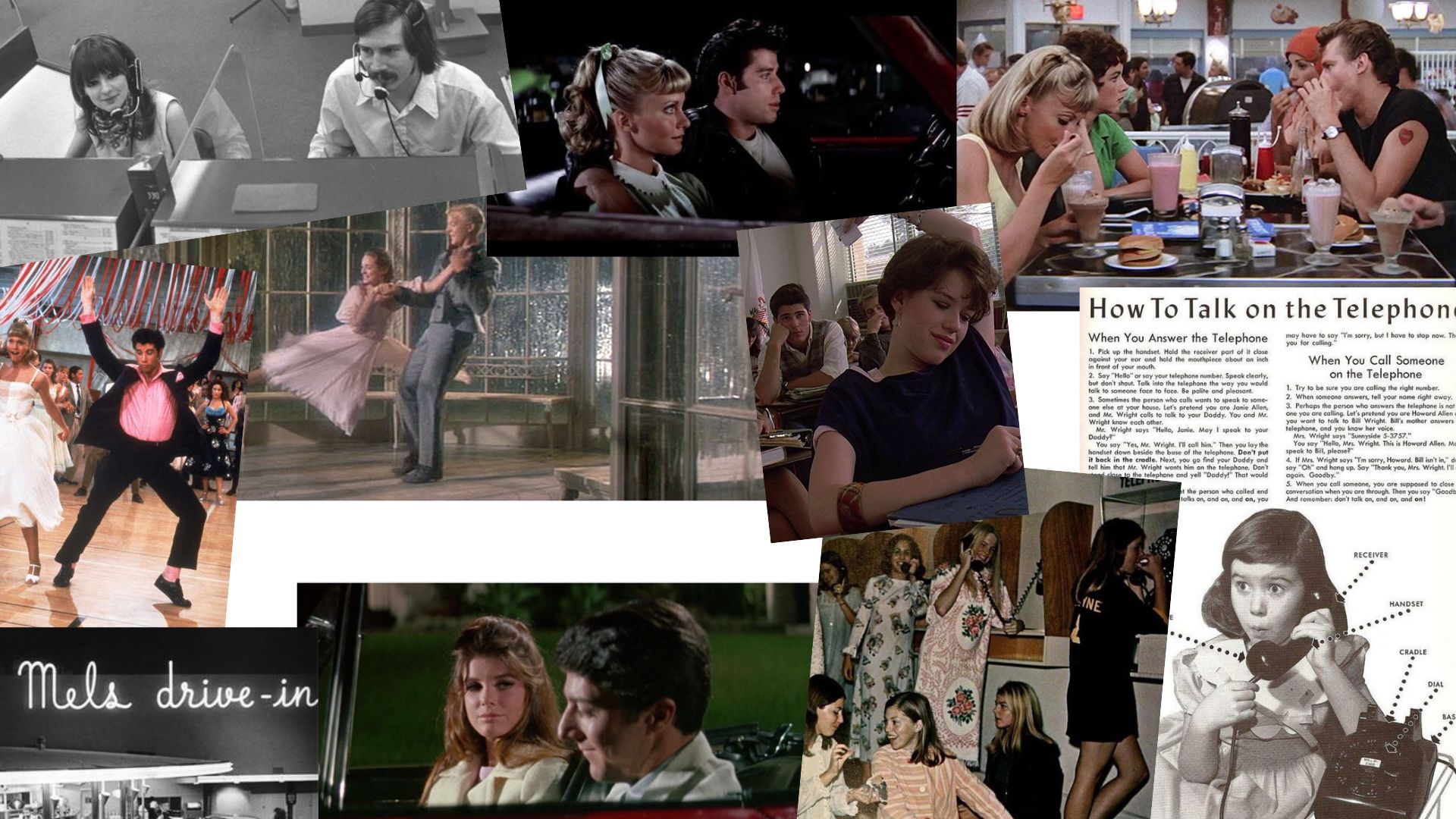
Made For the Screens—The Generation of Ultimate “Meet Cutes"
Baby Boomers: (n. 1946-1964)
Sneaking Out for a CallNovember 7, 1967, 5:50 a.m.
The sky, bruised a deep indigo and nestled up against the golden corn fields, gently stirs awake like clockwork.
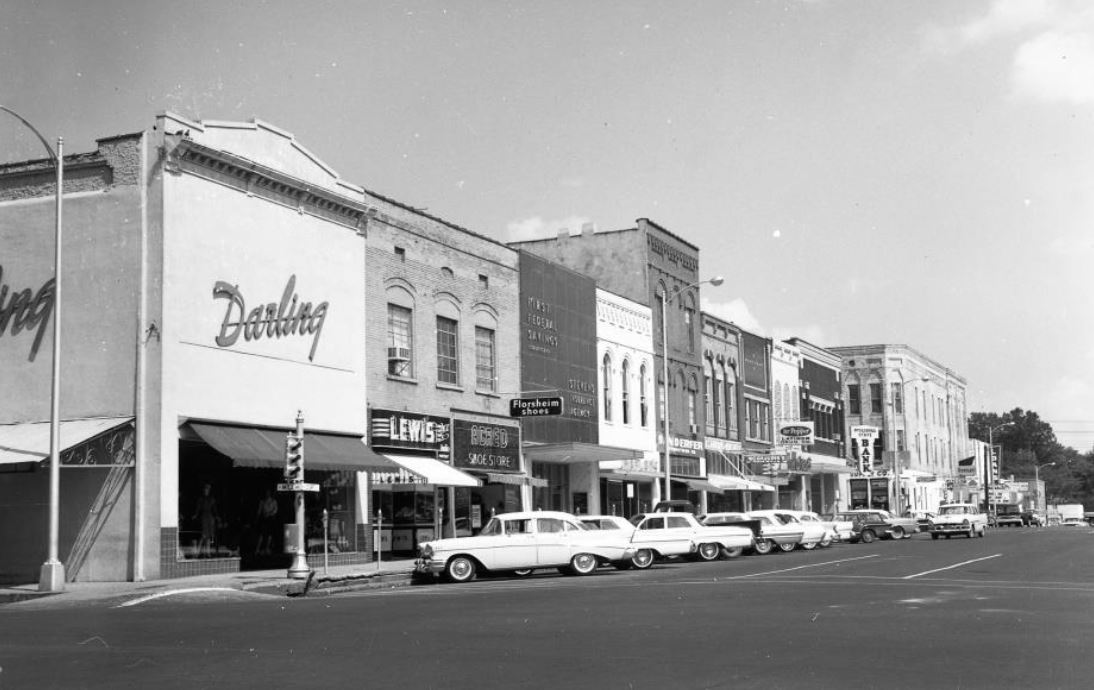
Dyersburg, Tenessee. circa 1960s. Photo Credit: Dyersburg Daily
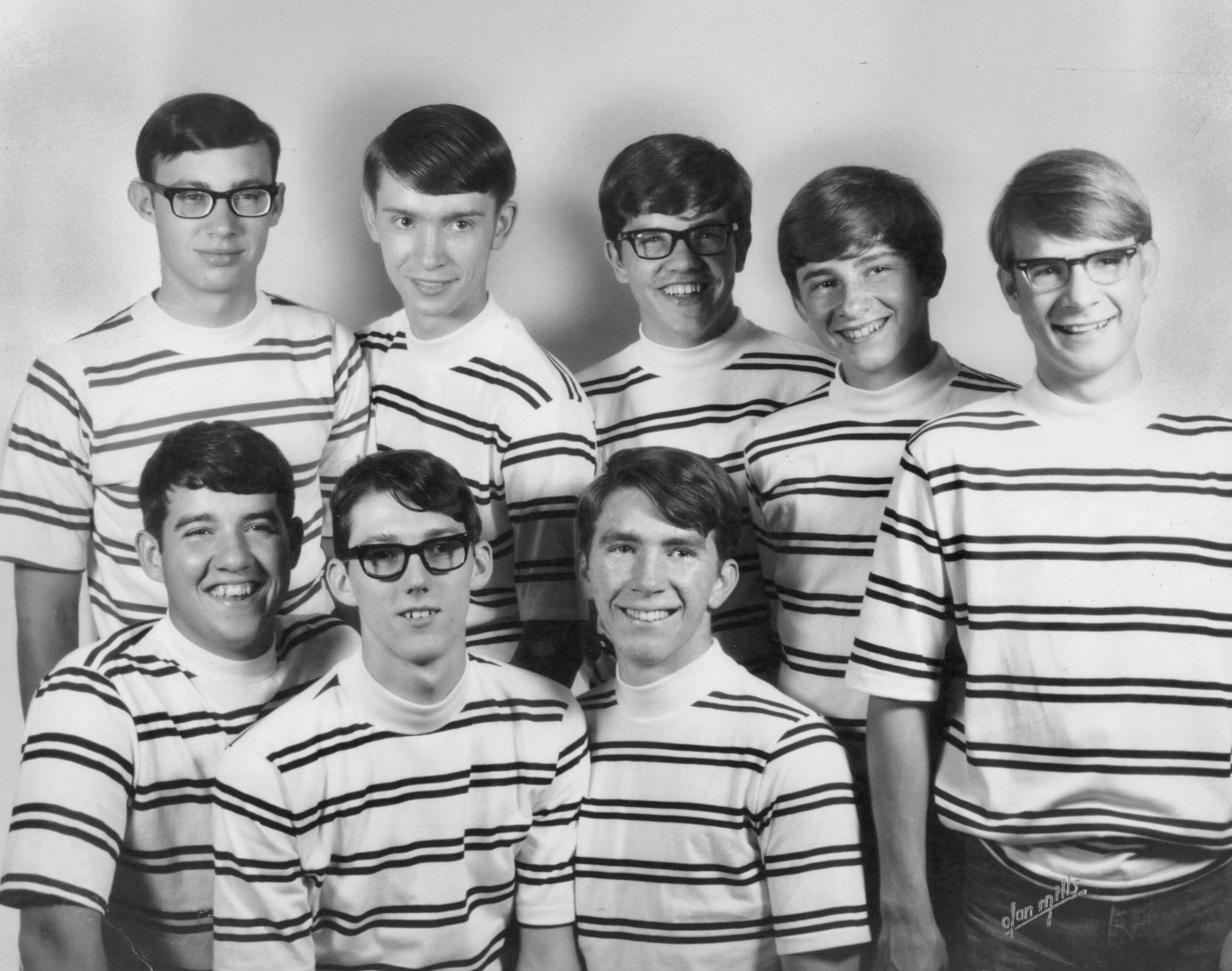
Danny and friends, circa 1969.
There’s no one, nothing for miles, along the worn out dirt path that travels from Mitchell Lane to Main Street in the humble town of Dyersburg, Tennessee that lives below.
A purring murmur can be heard in the distance, on the top of the hill where the sun,groggy and heavy, has begun to pick itself up and slowly crawl into place.
Danny Walden, then 16 and ripe with the kind of youthful energy that makes sleep optional, sits in a red box. His platform Nikes are propped up against the glass pane across from him. His elbow, weary from another long night, rests against an icy steel bar that lines the inside of the cube.

It’s been hours since Danny first slid slyly through the crack in his bedroom window, pounced onto the cool spongy grass below, and walked over half a mile to the phone booth. He told me this journey became a nightly ritual, the pot at the end of the rainbow having proved to be well worth the risk each time.
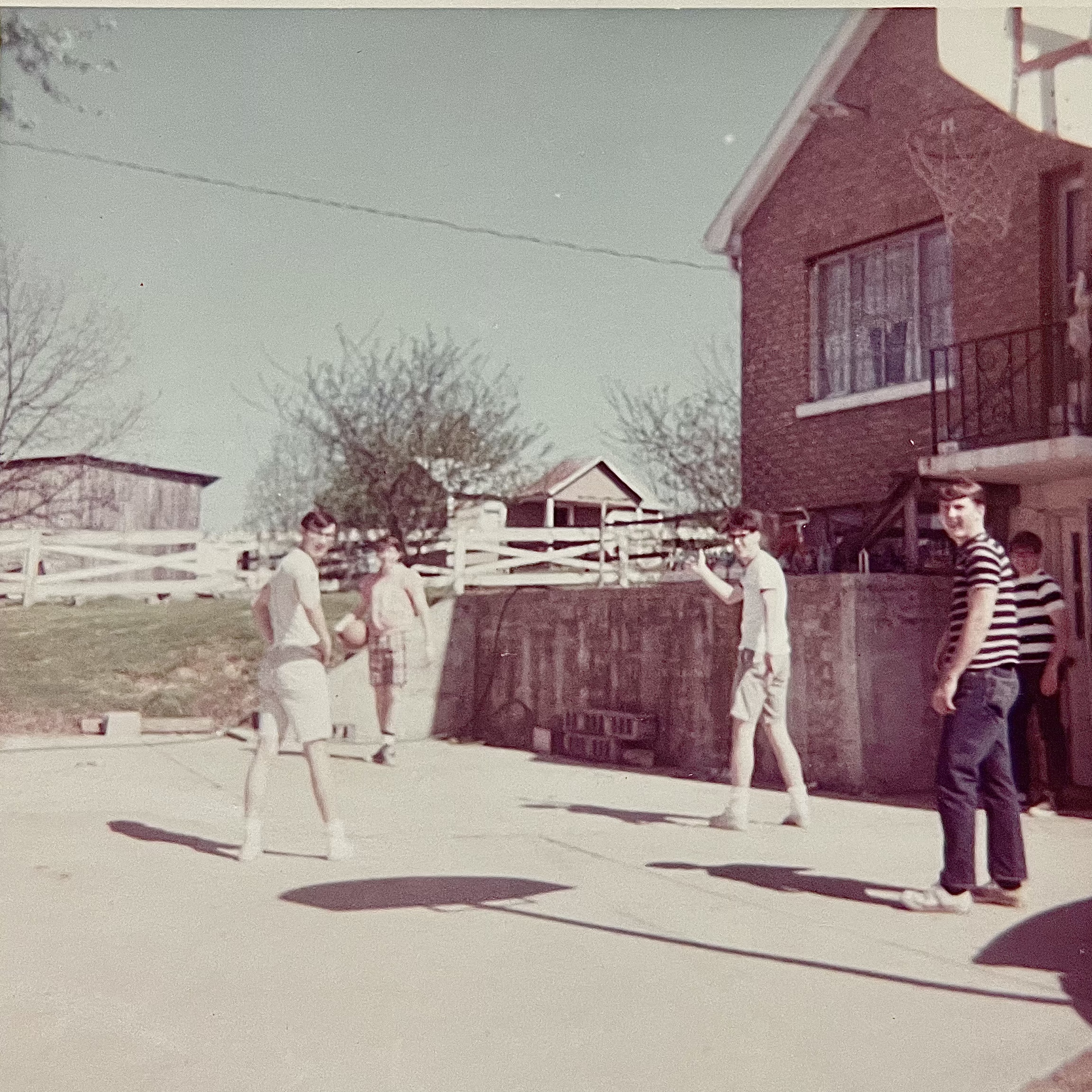
Danny and friends shooting ball outside the basement he would sneak out of.
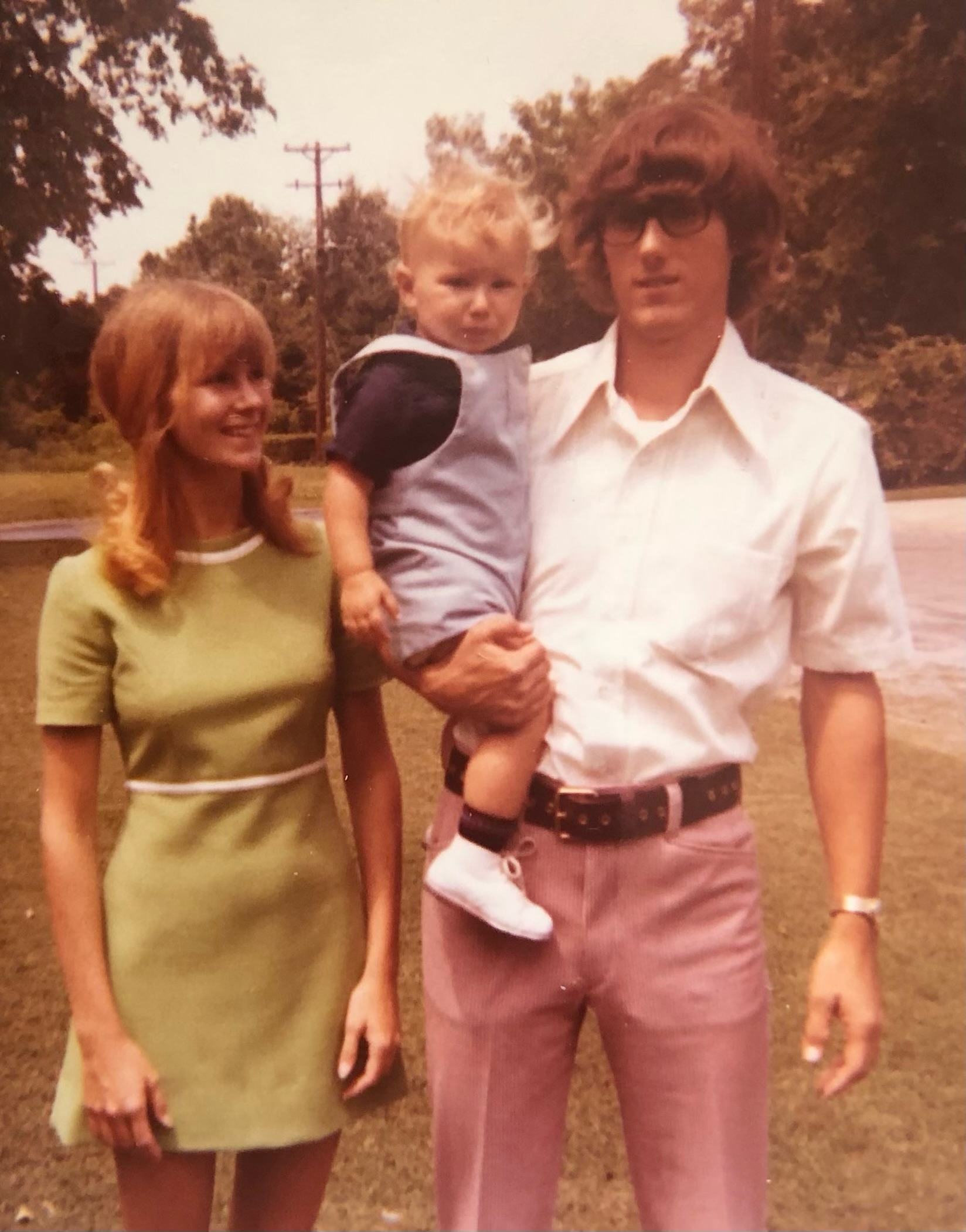
Stan and Barbara with their son Mitch, circa 1972.
“There was no other way to reach my girlfriend besides the phone, and I was desperate so I had to get creative,” he said. “I would spend hours in that phone booth–I went there every night for months.”
Now 72, Danny still has the same fervent energy for life as he did back then. As he reflected on the times, he emphasized the telephone’s central role in keeping you connected with significant others and friends. Meeting someone for the first time, though, was a strictly in person affair.
The chance of seeing a romantic interest, or better yet, of meeting someone new, was often up to chance–or fate, as some may say. There were certain spots, as Stan Anderson, 72, recalls, where everyone in town would go and meet up.
“This was moreso on the weekend probably was you went to the local burger joint hangout, ‘cause you knew you was probably gonna see whomever you might be looking for was probably gonna drop by there at some time,” he said.

The Place To Be
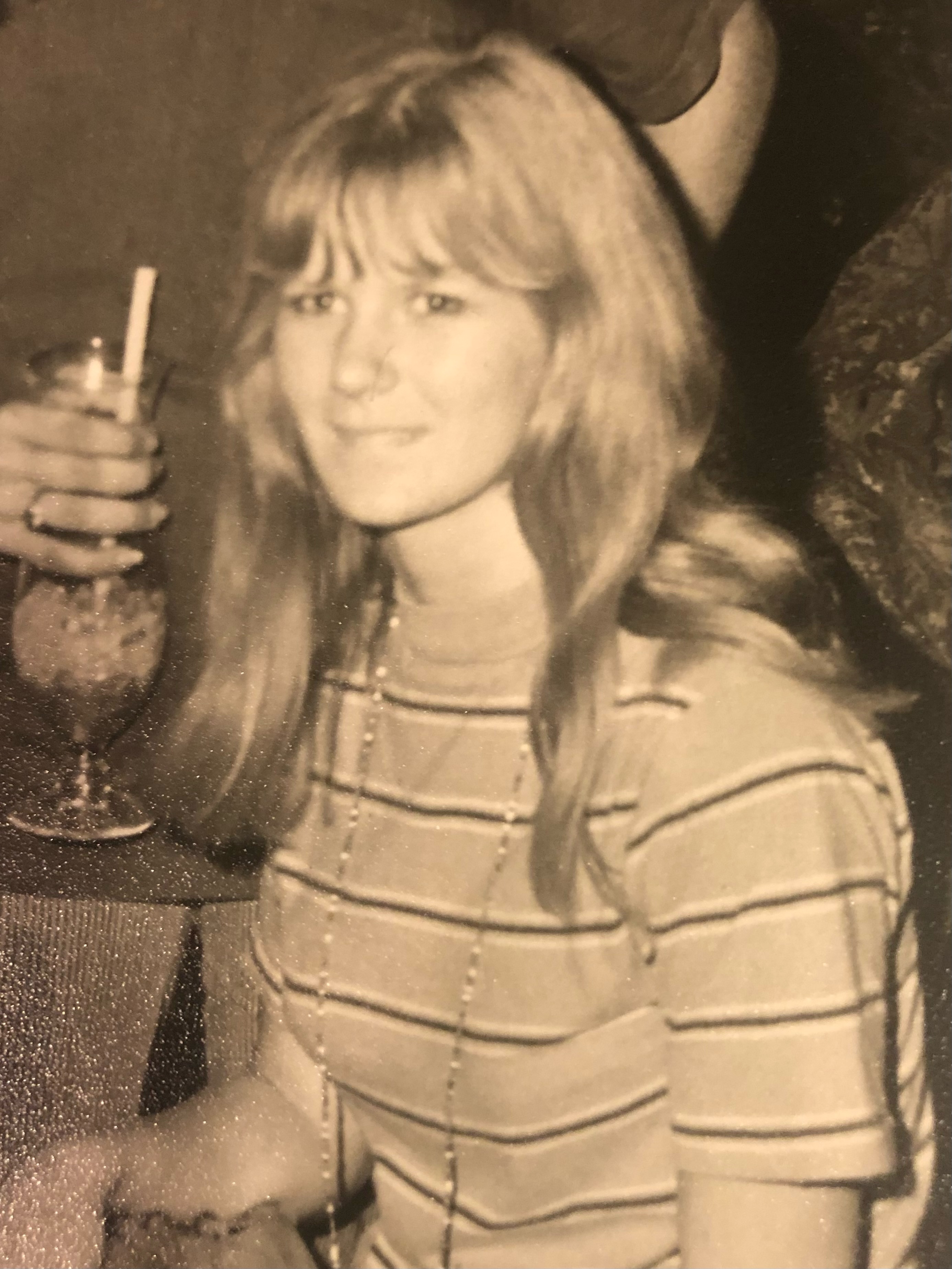
Stan’s wife, 73-year-old Barbara Anderson, remembers the moment when her sister met her future husband at one such spot:
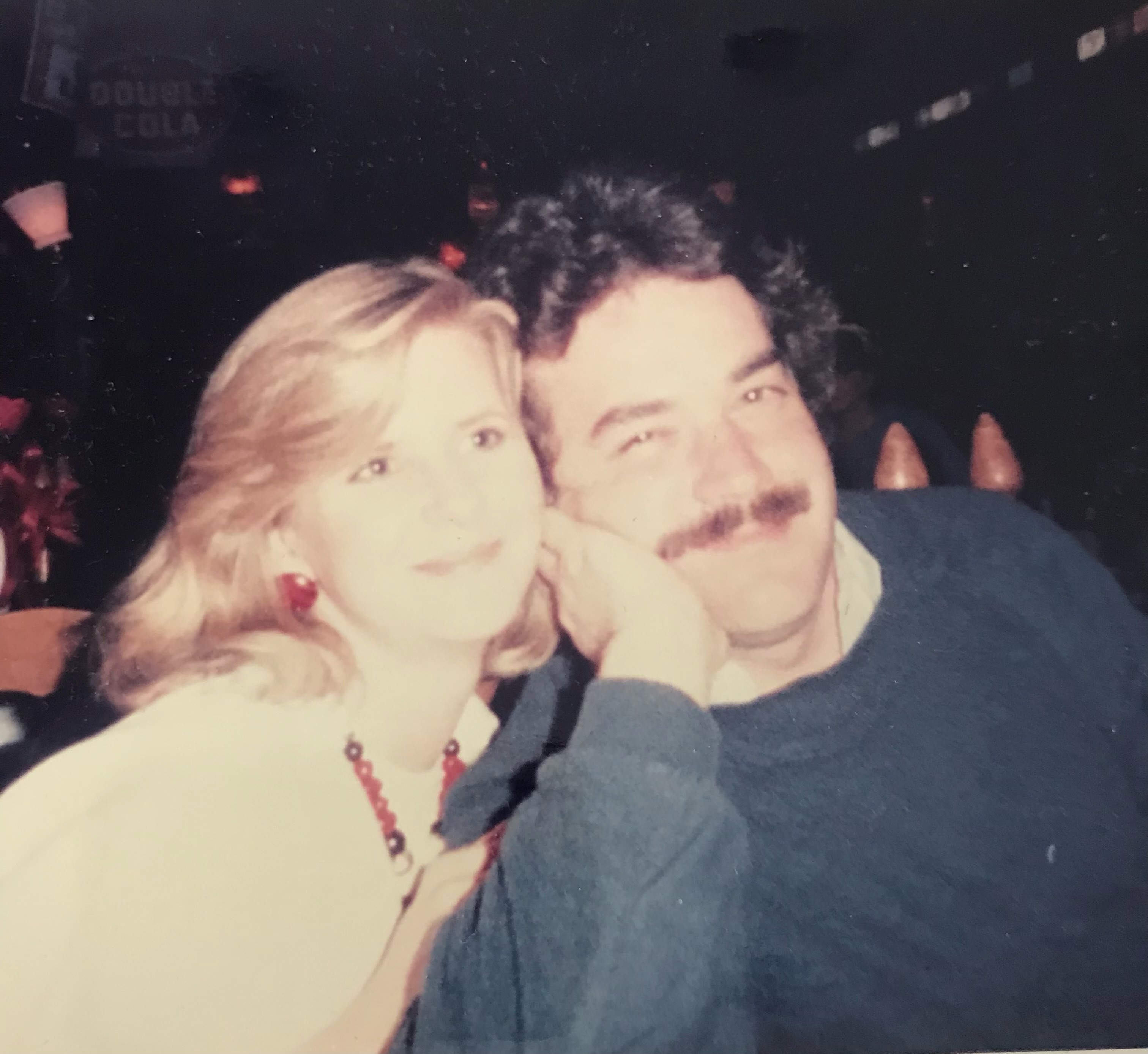
Susie and Bill, circa 1980.
Meeting people happens through personal pipelines, either at functions like parties, church, hangouts, and even school, or through your own network, such as through a friend.
Susie and Bill Nichols, 69 and 73 respectively, met volunteering at a church event in their hometown of Lexington, Kentucky.
“Back in that time, you generally met others from work or school and that was it, but now of course, that’s totally changed.” Bill said.
Local media also played a role in disseminating information about the happenings in local communities so that even without direct communication, you knew where to show up to see that special someone.
“We would just have to make plans ahead of time to meet up with people, that's what you did,” Susie added. “Newspapers published all the events so you knew about them–everybody got a newspaper back then.”

Why Don't You Write Me?
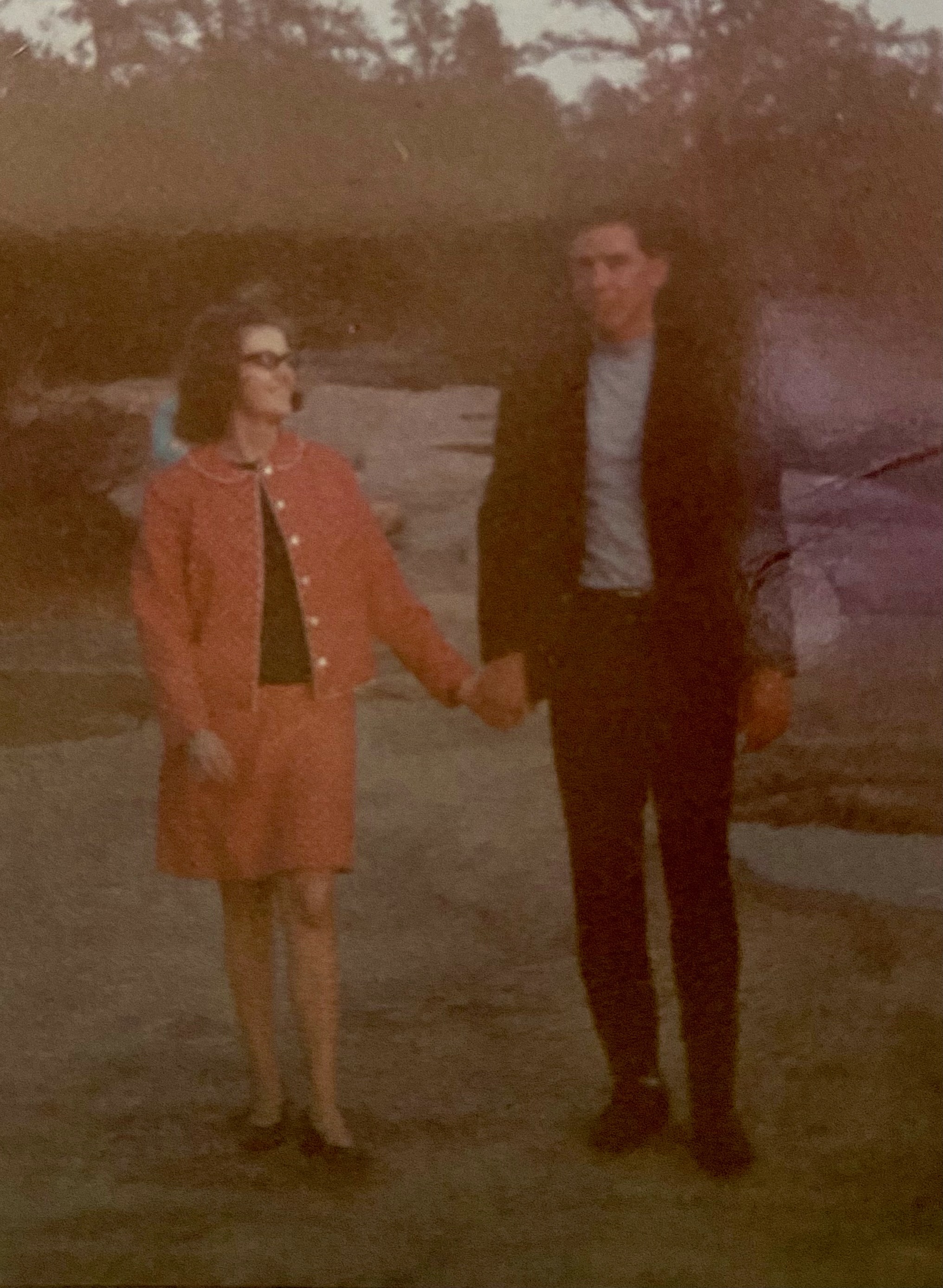
Jan and Denzil on one of their first dates, circa 1967.
Keeping in touch with someone though, was more difficult. Sometimes when the call was too far or the time distance was too great, good old fashioned letters were the only option.
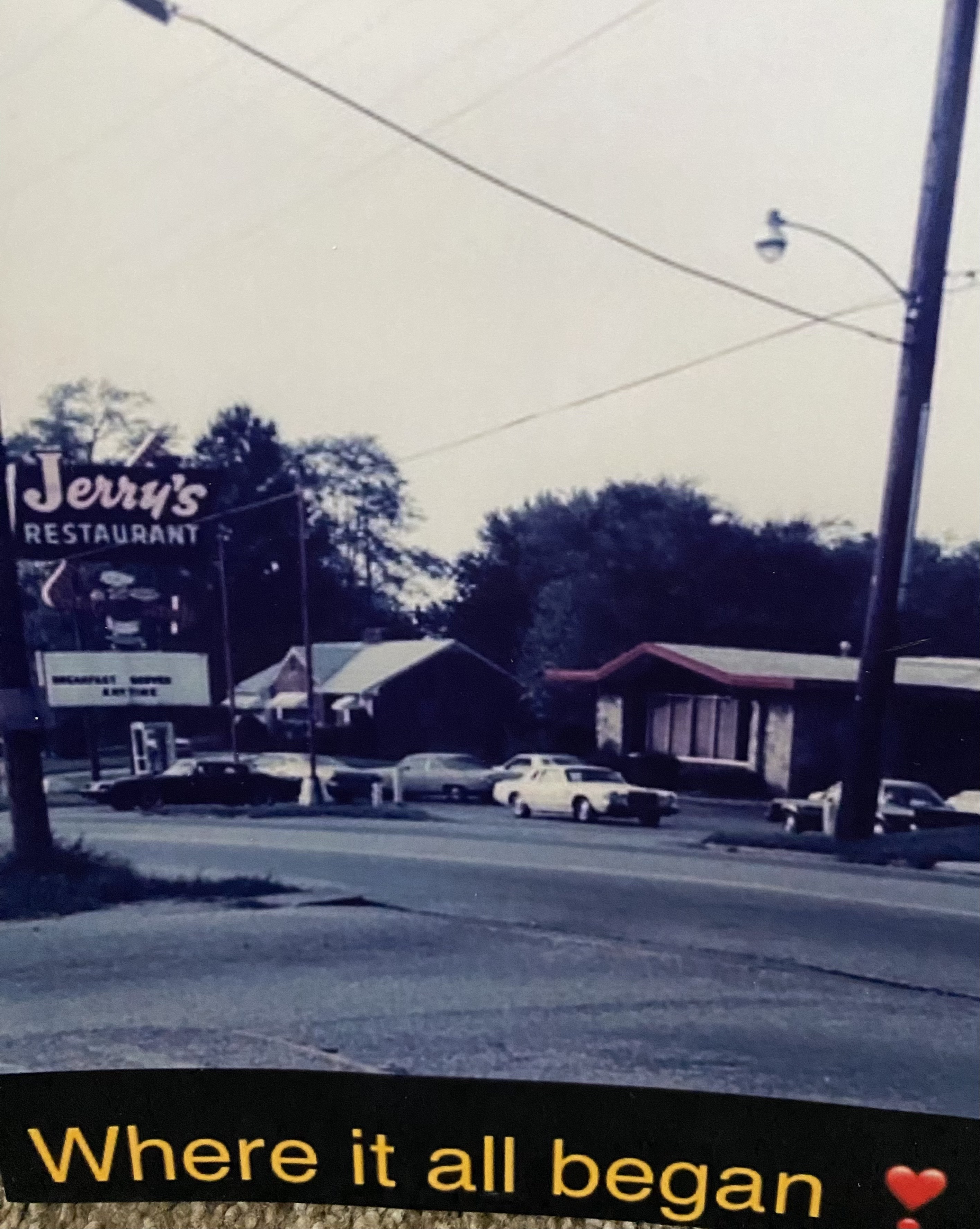
The spot where Jan and Denzil met.
Janine and Denzil Cole, 76 and 77 respectively, met at one of these very hangouts. Shortly thereafter, Denzil was drafted during the Vietnam War. The two exchanged letters often for three years, as was customary during this time when you had a romantic interest across the nation (or the globe).
“When he was in the army, that’s how we did it, we didn't call or anything. You’d write about every day or so and it took probably a week or week and half to get to you because it was going overseas. You just had to sit and wait for it.”
Listen to Jan debrief me on what that process looked by clicking the audio beneath the picture to the left.
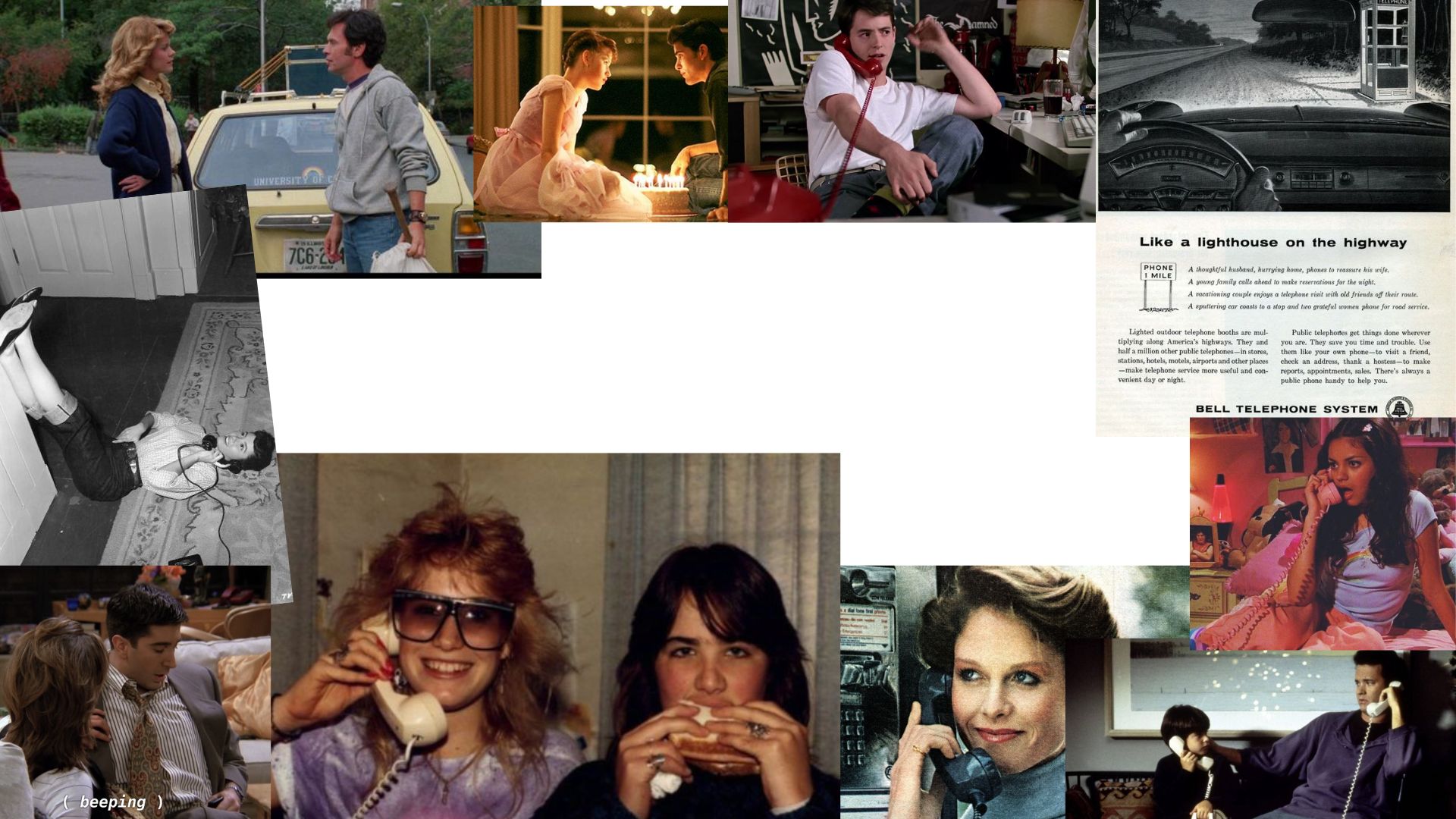
Hit My Line—The Telephone and Gen X.
Gen X: (n. 1965-1980)
Camelot and ClichésSeptember 7, 1988, 6:59 p.m.
It’s a crisp, golden Friday evening at summer’s end. The air, hot and heavy, is saturated with anticipation. You catch a brief whiff of grilled hotdogs and freshly cut grass, but mostly, it smells overwhelmingly of sweat.
A whistle blown from below travels quickly up to the stands. You wince and tilt your head, hoping to shake off the discomfort of the ringing, still pulsing in your ear. Suddenly, the crowd erupts in cheers and shouts that seem to shake the earth, as if signaling the start of some ungodly uprising from below.
It’s almost game time.
Friday night football games are a whole town ordeal. Everyone and their mother fill into the rickety old bleachers at their alma mater, ready to watch the battle. They're waiting to find out who wins, but more importantly, to see which football player–cheerleader couple will be crowned king and queen in some unironic botched rendition of Camelot (but without all the death).

Sound familiar? Overwritten? Cliché?
If that made you feel a bit like a cardboard chess piece in a cheesy, overplayed 80s rom com plot, then I succeeded. To my shock, it turns out that this classic story has some actual roots in reality for Gen X. Even as technology expanded–most notably, the telephone to pager pipeline–the act of meeting someone in person stayed winning.
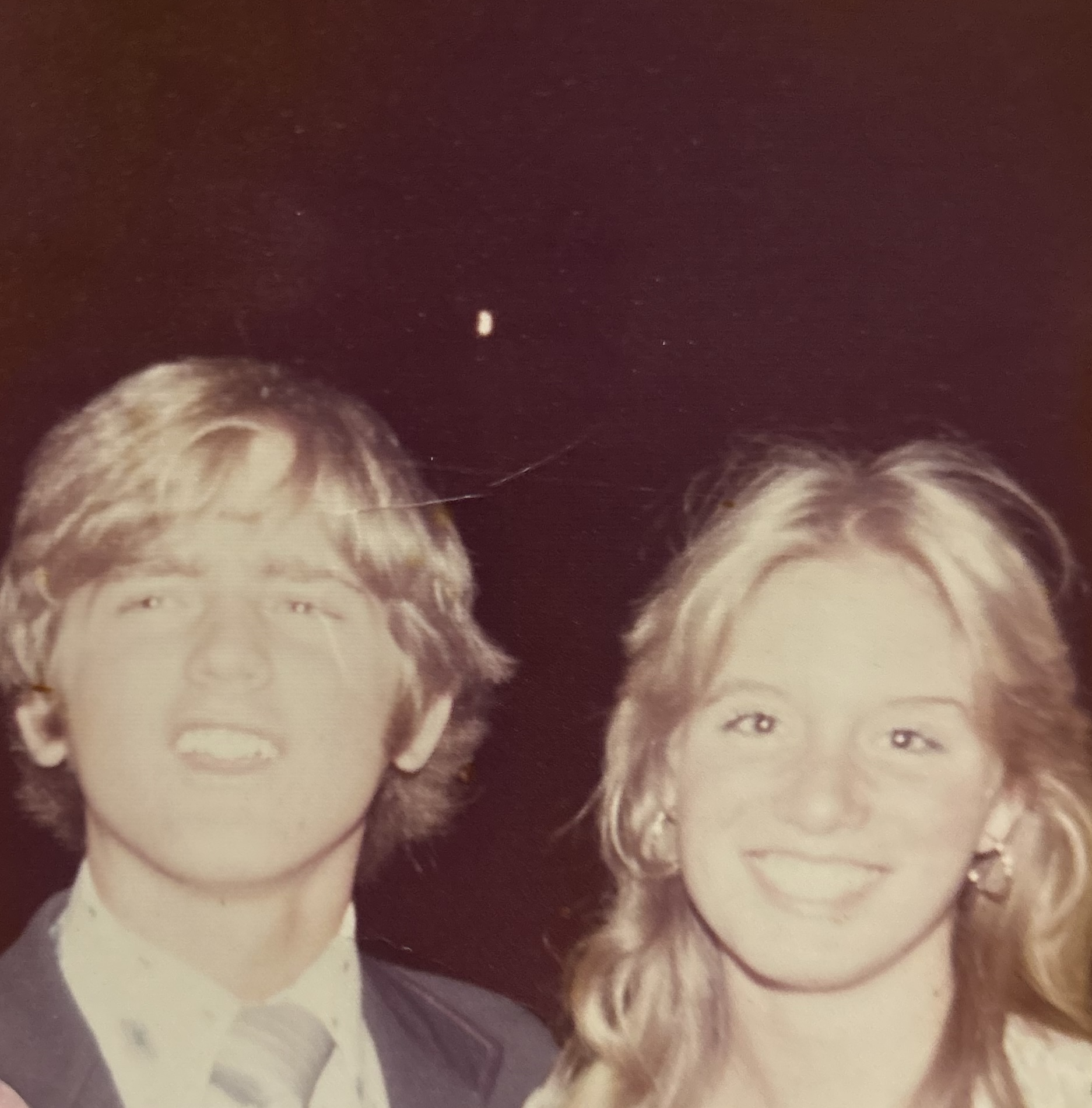
Karen and Bob during their senior year of highschool, circa 1983.
Just like their parents, Gen Xers mostly met people through school, work, or other in-person events. Their circles were small, so their options were pretty much whoever was right in front of them.
Karen Wood, 58, met her husband in middle school. They were highschool sweethearts, and wait for it–the embodiment of the cheerleader-football player homecoming royalty archetype.
“I think it was just being in school together and being at school functions that really brought us together,” she said. “He played football and I was a cheerleader, so we were always kinda headed to the same things, and everyone was rooting for us.”
She told me her husband Bob claims he knew she was the one since they were thirteen, but it took her until junior year of highschool to come around. How’s that for chivalry?

Pick Up the Phone
It took me some time to really visualize what the Gen Xers I interviewed meant when they talked about the corded phone that hung on the wall. I’ll admit my ignorance and say that frankly, I figured a device as ancient as that would’ve dated back to the 1930s. I was wrong.
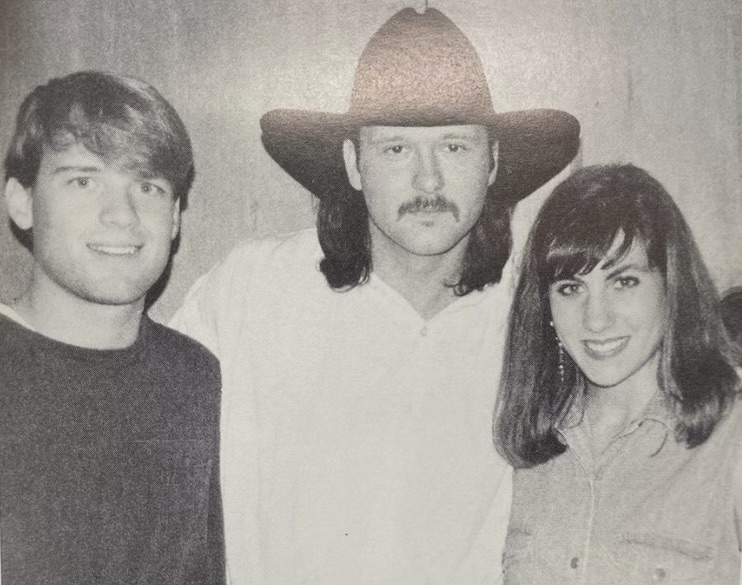
Kimberly and her now husband Mitch with THE Tim McGraw, circa 1994.
Kimberly Edgeworth, 49, says that everyone she dated in her teens and early twenties she knew from school. She met her husband at freshman orientation, but halfway through college he transferred to a college out of state. As a result, her and her then boyfriend “wore out” the chorded telephone, as she said.
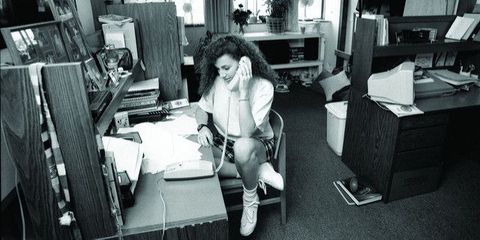
Images from a college dorm room...the corded phone
“I remember my roommate had gone to bed in college, I would be sitting out in the hall and pull that chord as long as it would go and chat with Mitch for hours.”
Thankfully, by the mid 80s, the cordless landlines were invented, so the trauma and back pain of yanking a chord into another room was removed (thank you, Sony!)"

The Pager, Or Should I Say, Game Changer
Lea Cheek, 55, was set up on blind date with her now husband by a mutual friend, an occurrence she says you simply “don’t hear that much anymore.” Thirty years later, they’re still going strong.
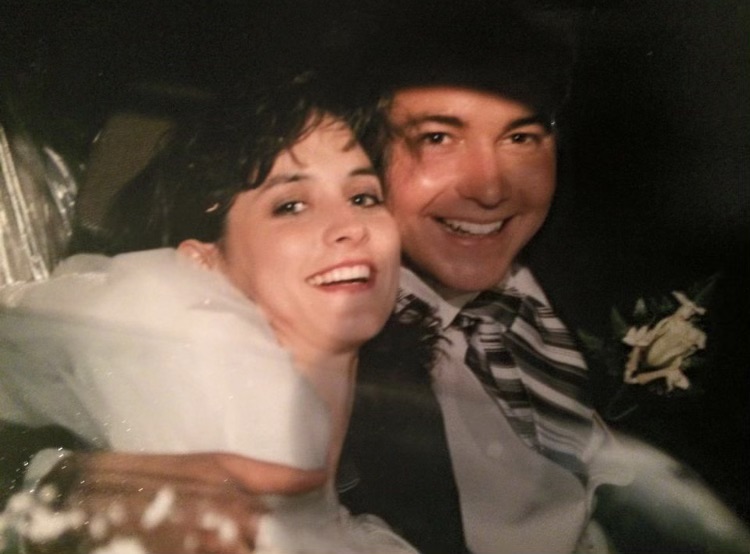
Lea and Ward Cheek, circa 1993.
Upon reminiscing on their dating days, it is the pager that sticks out as most salient in Lea’s mind when it comes to communication.
“I remember when Ward and I first started dating they had just come out with the pager so I could page him and send the number and then he would call me back. It was even that way I think when I had Claire when I was pregnant with her because I had to page him when I went into labor and then he met me.”
The pager made it so that reaching someone was much faster and more efficient. Back in the time of landlines, if the line was busy, you might miss an important call. With paging, you can see what number is trying to reach you, so it was easy, if you had a loved one’s number memorized, to know immediately if they were trying to get in touch with you.

Sara Wiley, 40, was kind enough to give me a rundown on the ability of pagers to send what sounds like a very early form of texting. Click the play button under the photo to the right to listen.
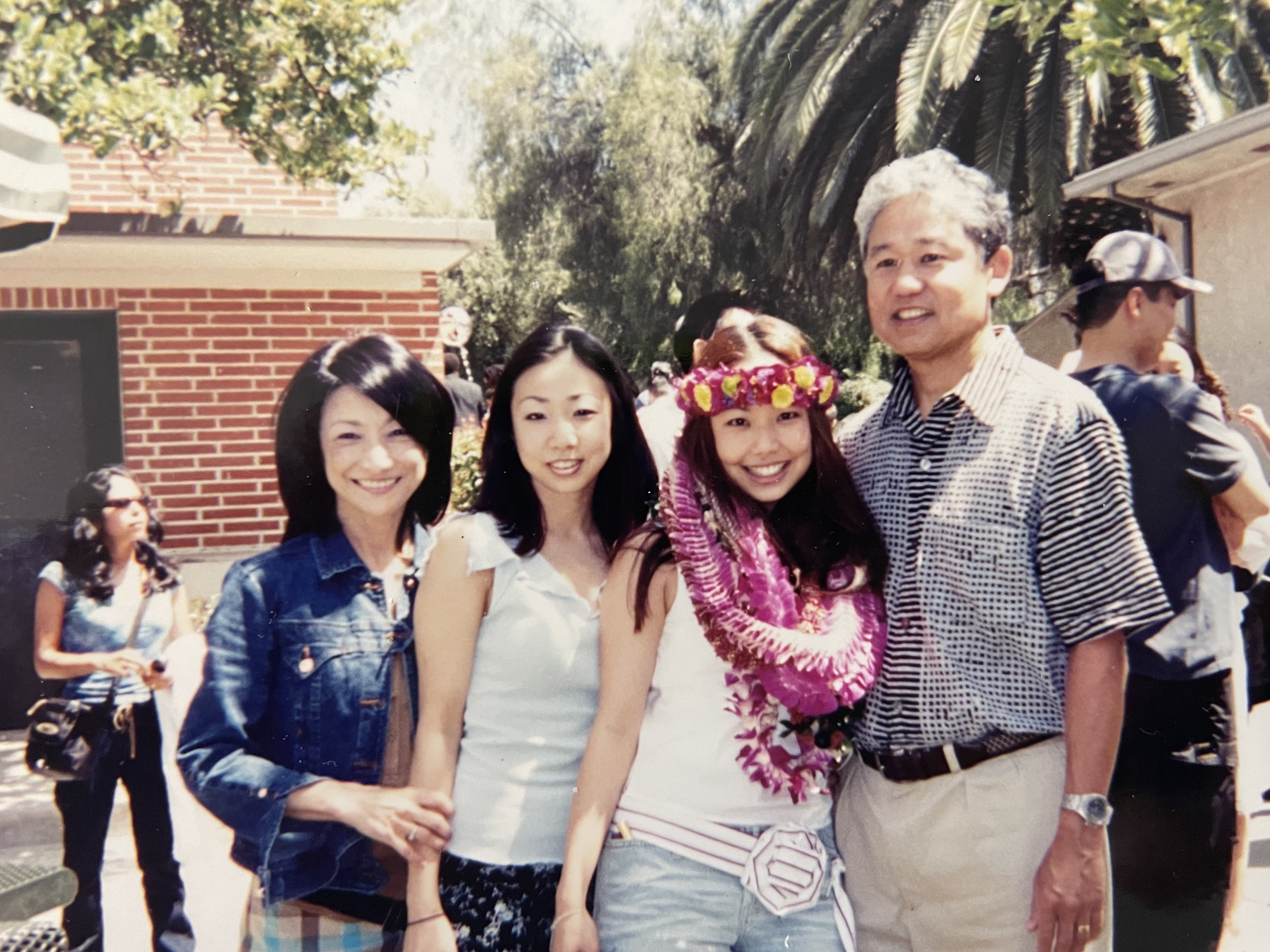
Sara and her family at her college graduation in Hawaii, circa 2003.
Pagers weren’t advanced enough to travel across the ocean, though.
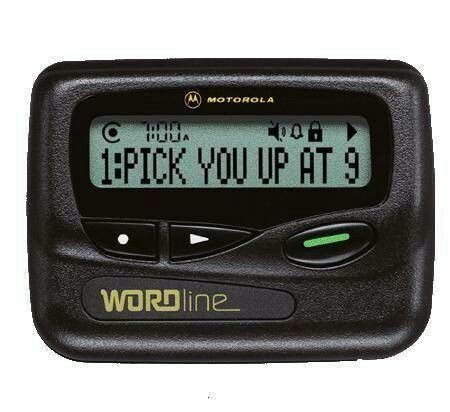
A real life pager...not exactly chic.
Thankfully, long distance calling was a thing; While in college, Sara communicated with her long distance boyfriend by scheduling phone calls in advance.
“I actually was dating someone who was still in Hawaii but I was going to college in California,m so we would schedule phone calls because we had time differences,” she said. “I remember being on the phone a lot.“

The Art of the DM–Gen Z and Social Media’s Love Affair
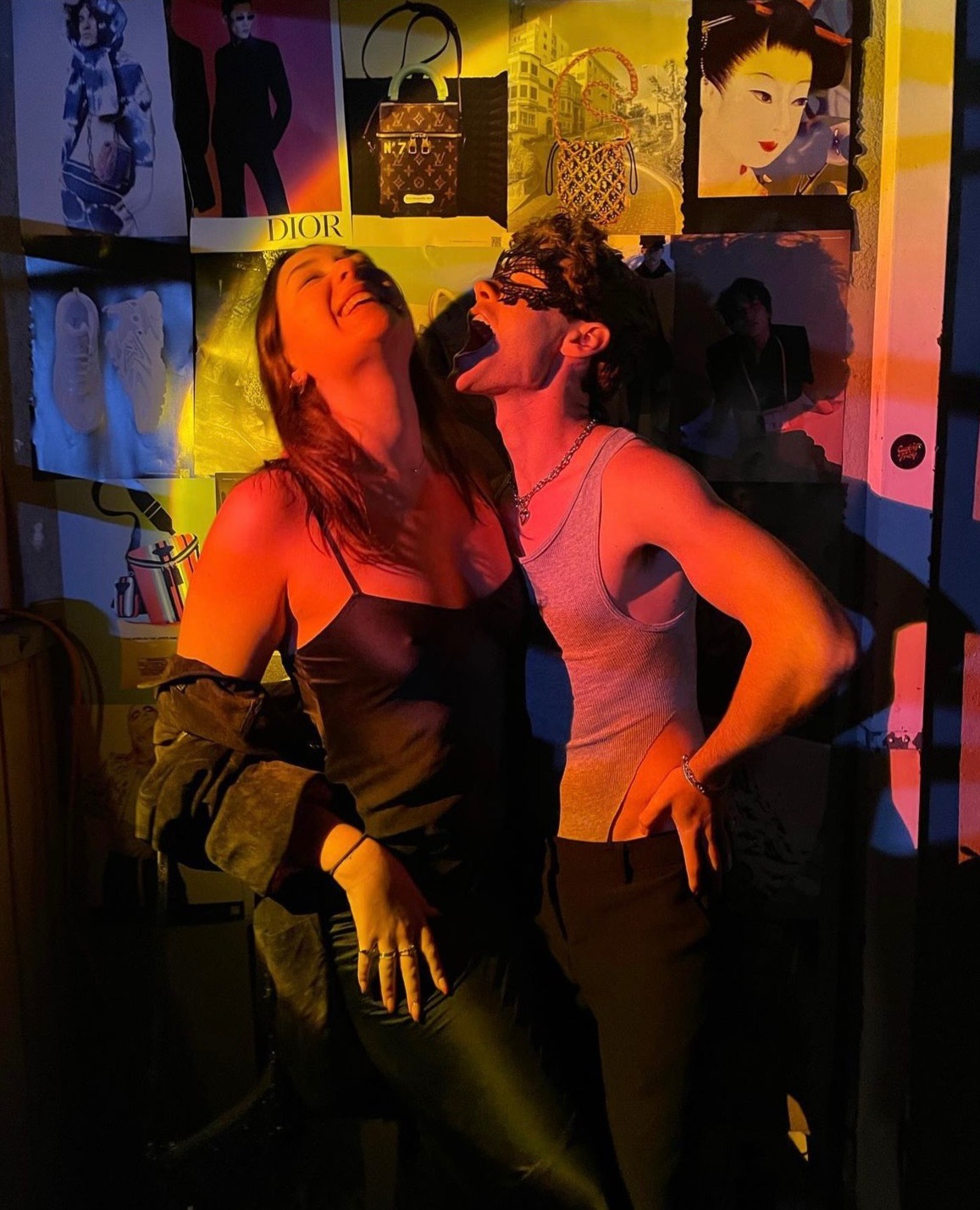
Tate and his best friend Kat, circa last November (2022)
Gen Z: (n. 1997-2012)
Tate’s Hot TakesMarch 24, 2023, 2:40 p.m.
It’s finally a warm, sunny day in Los Angeles, following a winter that lingered in the grasp of gloom and heavy downpours for what felt like an eternity. I’m lounging outside GreenLeaf, one of USC Village’s best spots. One hand holds an almost empty Diet Coke, the other rests firmly under my chin. Having intended to take notes, my journal and pen sit eagerly in my lap. I haven’t touched them since we got here, the conversation too intoxicating to bother sacrificing remaining present in the moment.
Tate, 21, is sitting across from me, one leg crossed over the other, his wrists hanging gracefully over the arms of the lounge chair he has sunk into. He looks fabulous, but then again he always does. Even his sneeze is exciting. I’m pretty sure he could make tying his shoes entertaining.
Tate demands a certain kind attention, the same kind of attention I imagine Mick Jagger garnered the moment he entered a room. It’s the way they make people feel without saying anything at all. Something about their coexistence in your space says “stop what you’re doing, stand up straight, and take it in–you won’t want to miss this.”

We’ve been sitting here for almost two hours, but it felt like 20 minutes. We meet for lunch often, but this is a special occasion. This time, I’ve struck gold as the sole audience member in what has become a deep dive into Tate’s romantic history.
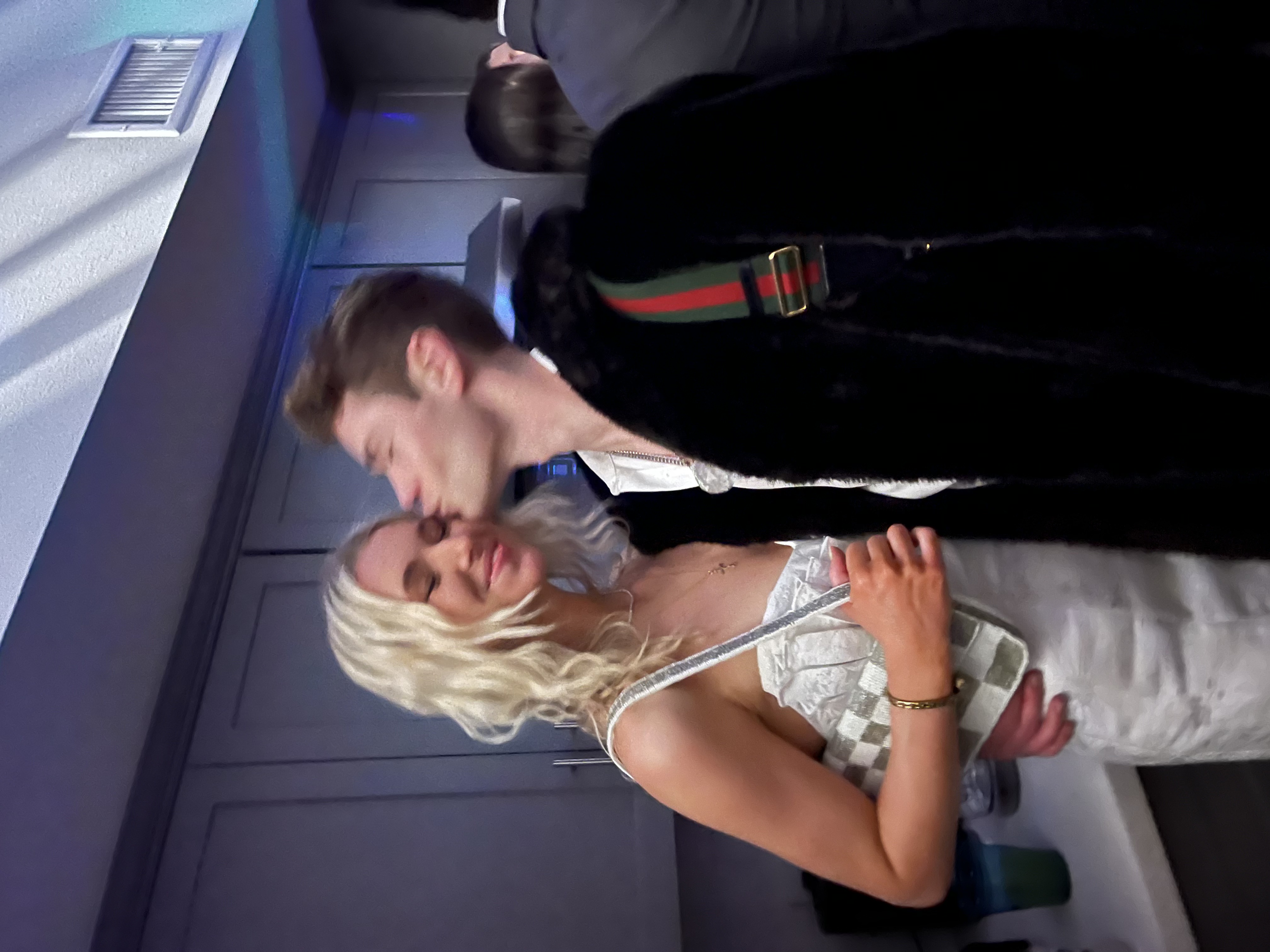
Tate and I at a party together in February.
Tate is gay, and he’s told me before how hard it is to meet potential love interests at USC. “It more difficult than you would think," he said one time after we went out to a popular Santa Monica club together.
Since highschool, he has met potential love interests online. “For me, finding people online has always been my default, and I came out in seventh grade” he said. All three of the official relationships he’s had in college have been with people he initially met on dating apps.
“I’m not saying that it can’t happen in person, I definitely have had things that happened in person, but they’re just a little less fruitful than what’s happened online,” he said.
The reason they’re more fruitful online has to do in part, he says, to the fact that you can learn so much about someone before even meeting them by examining their dating app profile and perusing their social media accounts.
Even if it “skews the initial romantic spark” you may get from first seeing someone new in a bar, it’s worth it to know what you’re getting into.

“If I meet someone online I have a lot of information in front of me that I can basically just see right off the bat more of their personality and more of who they are,” Tate explained. “You’re displaying six different photos, maybe you connect your Instagram, you answer a few prompts, so that I can do my proper research and pick out red flags immediately.”
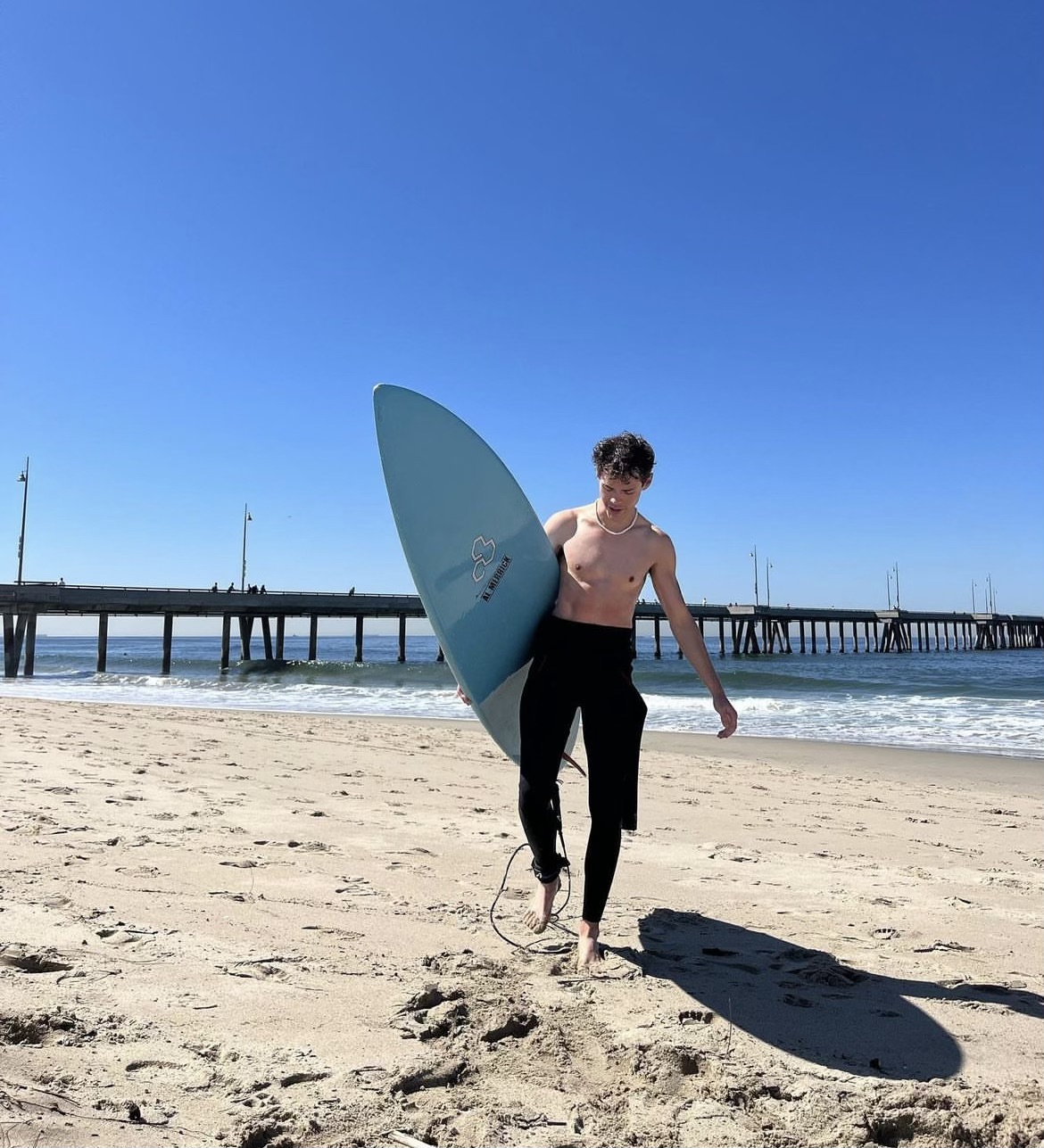
Tate on a recent Malibu surfing excursion.
In this way, Tate says, the dating experience through apps and online platforms becomes easier and potentially more successful, because the people you choose to go on dates with are individuals you’ve already screened and determined you have a good chance of connecting with.
"For example that guy who I met organically recently, the conversation we ended up having was boring because we didn't really have that much that we connected on, and had we connected on a dating app or had I seen his Instagram or something I could’ve kinda felt out that we weren’t going to be a good match, and we ended up not being one.”

Maggie and Alex
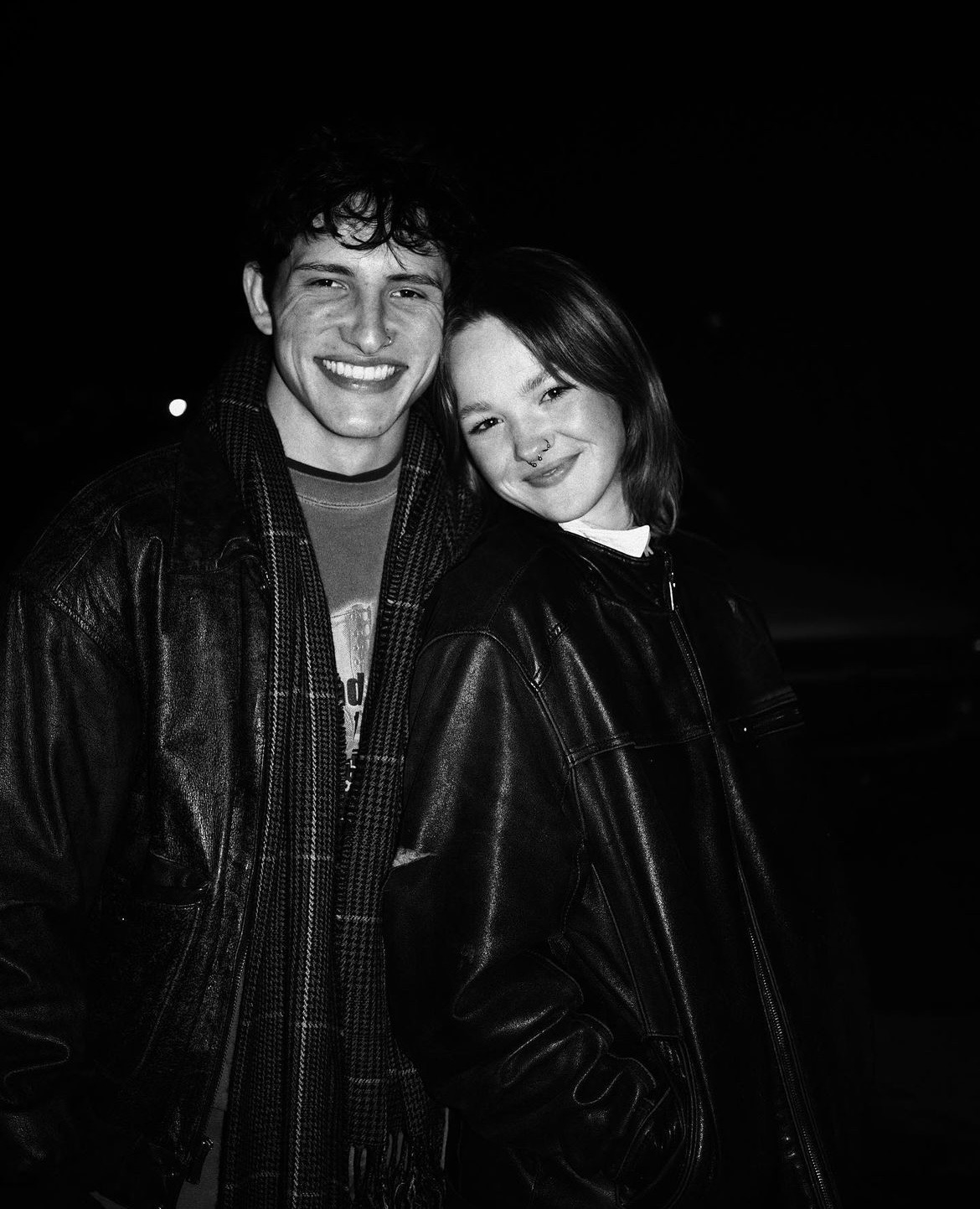
Maggie and Alex, circa 2022.
Alex Kline and Maggie Schut, both 22, met two years ago on the popular dating app Hinge. Hinge is essentially an elevated version of Tinder–in addition to photos, profiles also contain prompts, which helps show some of the potential match’s personality and interests.
For Alex and Maggie, messaging on Hinge kind of felt like a first date. After they matched in January 2021, they both tested positive for Covid, so they were talking on Hinge for about a month before meeting in person.
Before the first time we even met each other in person, we had kinda gotten the pleasantries out of the way,” Alex said. “We talked about the things you would talk about on a first date, but like on Hinge.”
Even though they had been messaging for a while, when the first date came around, neither one of them knew what to expect. How you present yourself online is one thing, but the presence you bring face to face is something else entirely.
“You can kind of like design your first impression instead of it being natural, you have the power to decide how you want to come across,” Maggie explained.

Part of this, Alex says, is just the culture of Generation Z:
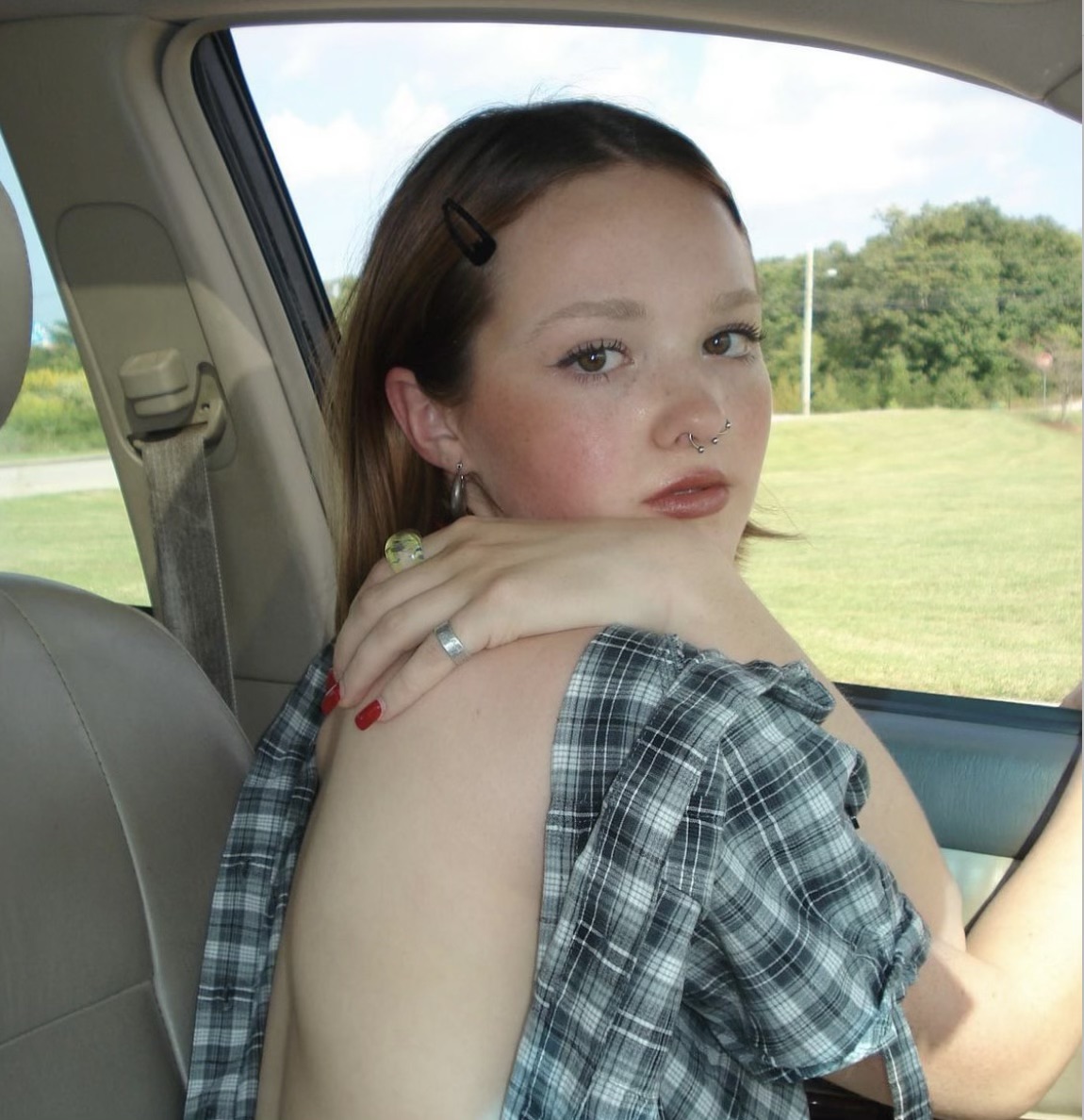
Maggie on why she feels there wasn't a loss of connection in their first meeting.

Alex on the point of dating apps...and other thoughts
“With our generation in this era there’s that whole thing where you intentionally wait a day to respond to a text or several hours because you don't want to come across a certain way and it probably does play a role in why we didn't talk that much, neither one of us wanted to be the one that was like blowing the other one’s phone up.”
Long story short, the introduction of dating apps makes it so that people can be extremely deliberate in creating their own image and shaping how they are perceived by potential matches, right down to text response time.
In Alex and Maggie’s case, a dating app was the spark that catalyzed a match made in heaven. Still, not everyone is convinced. The element of in person connection is still very real, and very important to many Gen Zers.

Putting in the Work (Or Not..)
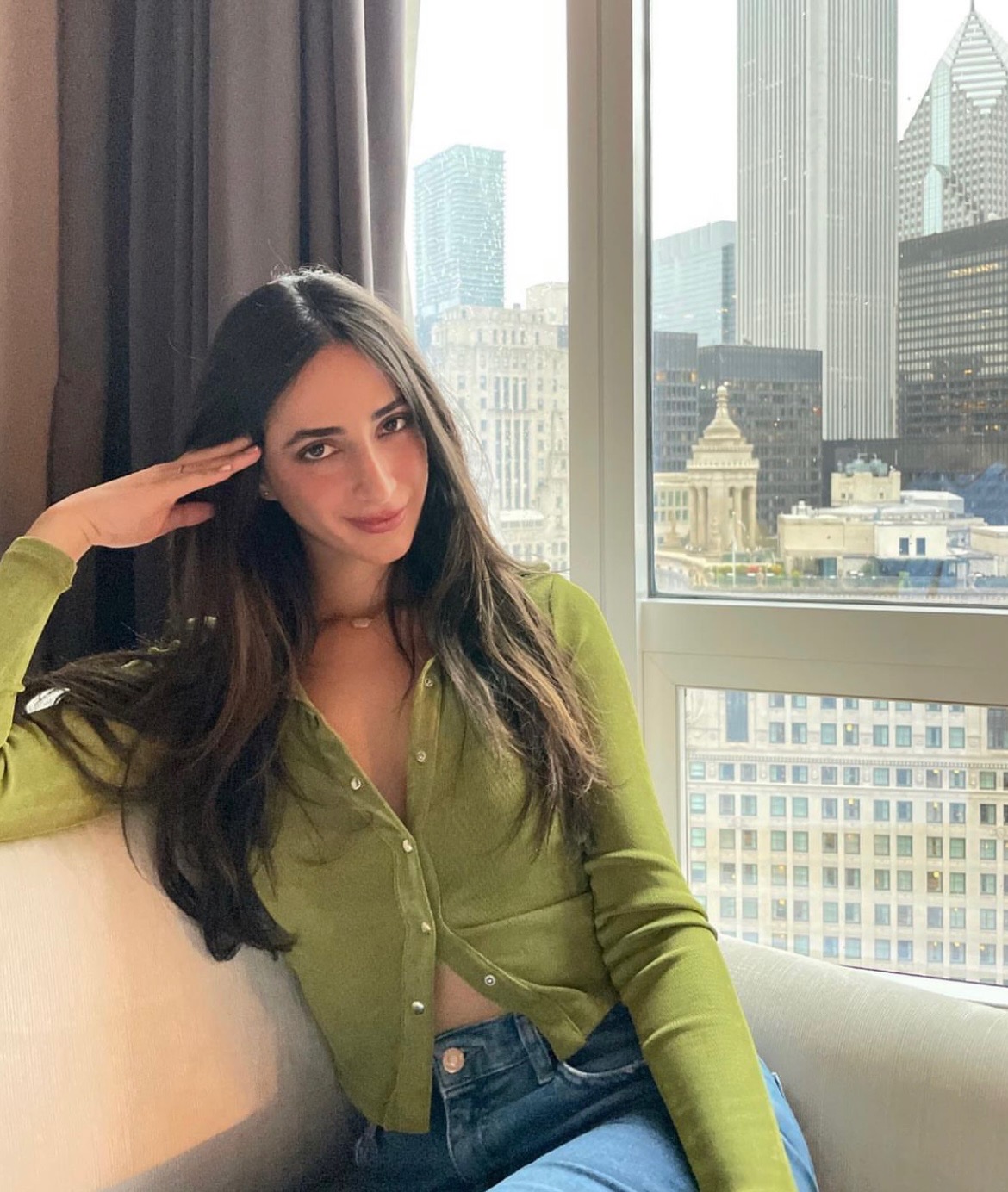
Mara Kabie, per her most recent Instagram post.
Mara Khabie, 22, says she doesn’t feel like she can connect with someone without that first initial in person meeting.
“Every time I try to get on a dating app, I don’t last longer than a week, she said. “I really need a chase, I need the instant physical connection in person or else I feel like I don't vibe with them, and feel like it’s hard to get that on a dating app.”
She also said she thinks that social media allows people to get away with putting in less effort than they used to.
“Literally 10 minutes ago we were talking about how like our parents had it so much better, and my friend's mom was actually just saying how she feels bad for us, because it's so much harder for us, boys used to have to try so much harder with girls, now they get away with just like DMing them ‘oh you're so pretty’ you know, it's just like so much easier for boys,social media's allowed them to do the bare minimum.”
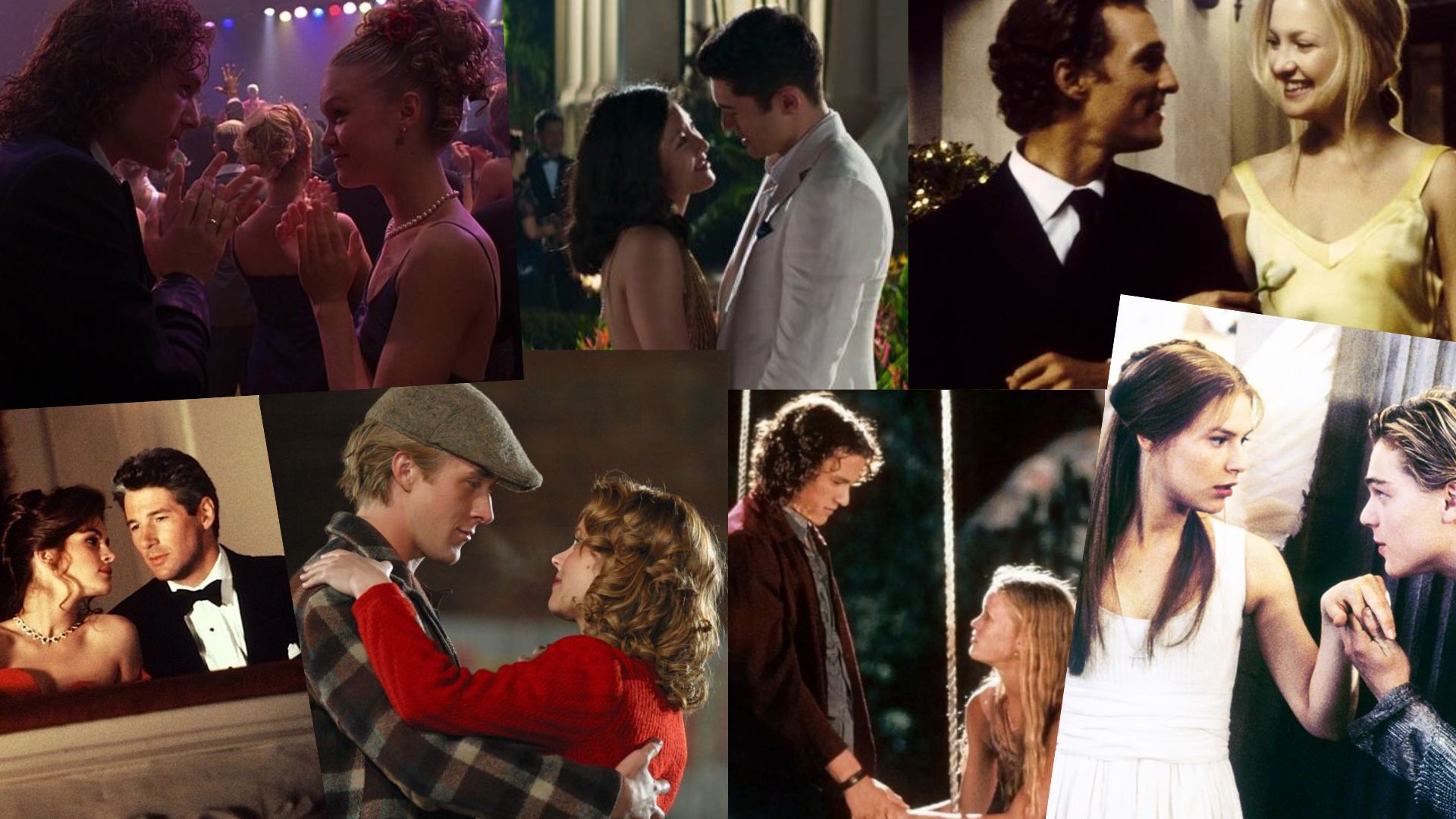
An Expert’s Perspective–Creator of the Love and Technology Lab
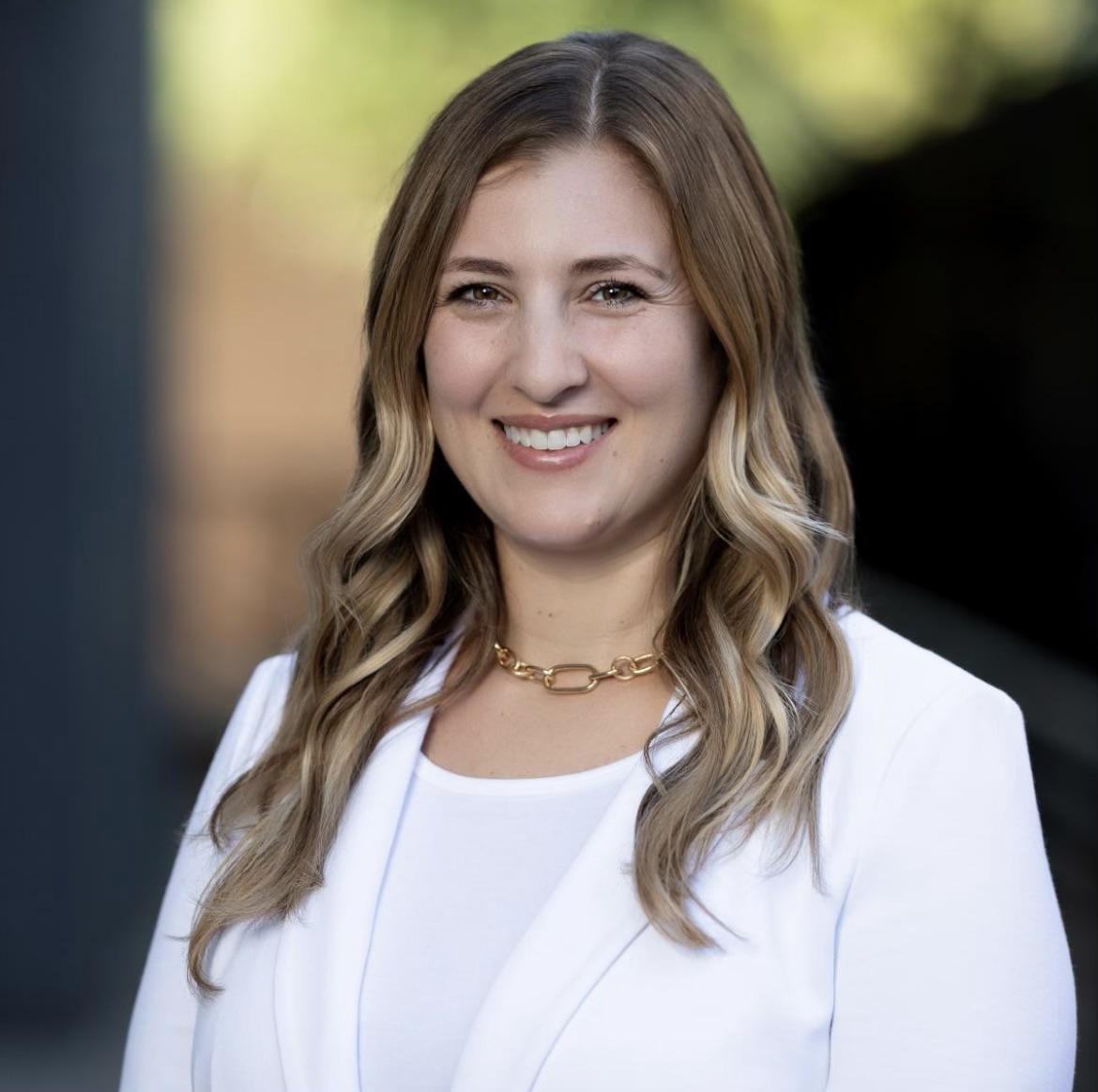
Liesel Sharabi.
Liesel Sharabi is an assistant professor of communication at Arizona State University and Director of the school’s Relationships and Technology Lab. Finding her was like striking gold. Her insight and research puts everything in place and fuses the anecdotes above with real data.
Love At First Sight-A Hoax?
Liesel is a firm believer that we tend to romanticize randomly meeting someone face to face–the idea of “love at first sight”--when in reality it tends to underdeliver relative to our expectations.
“I think we romanticize this idea of what it's like to meet somebody face to face. To me now it almost seems quaint to think that your soulmate or the person that you’re meant to be with is just the person who you happen to run into at the grocery store or who happens to workout at your gym like you’re just putting so much into fate and just luck to introduce you to somebody versus online dating where you have an active choice and a role in the process where you’re going out there and you’re looking at potential partners, you’re meeting lots of different people, so that when you do find somebody you can feel like you chose that person and not like this was a person brought to you just out of chance or circumstance.”

The idea of taking ownership of your pursuit for love and making active choices with online dating platforms, instead of stumbling upon it, sounds empowering, but it has its drawbacks: notably, in the tendency for users to sort of lose sight of the fact that they’re actually looking at real humans with real, human emotions.
“Right now there’s research that compares this to e-commerce and sites like Amazon–it kinda feels like the same experience sometimes when you're flipping through profiles on a dating app,” she said. “You forget that these are real people putting themselves out there and you fall into that mindset of swiping because the pool seems endless.”
Online dating takes away some of the accountability that comes naturally with in person dating. On social media, you can ghost someone easier because for one, there’s more options, and also, you know you’ll probably never see that person again. As a result, Liesel says, it’s “really easy for people to behave badly.”
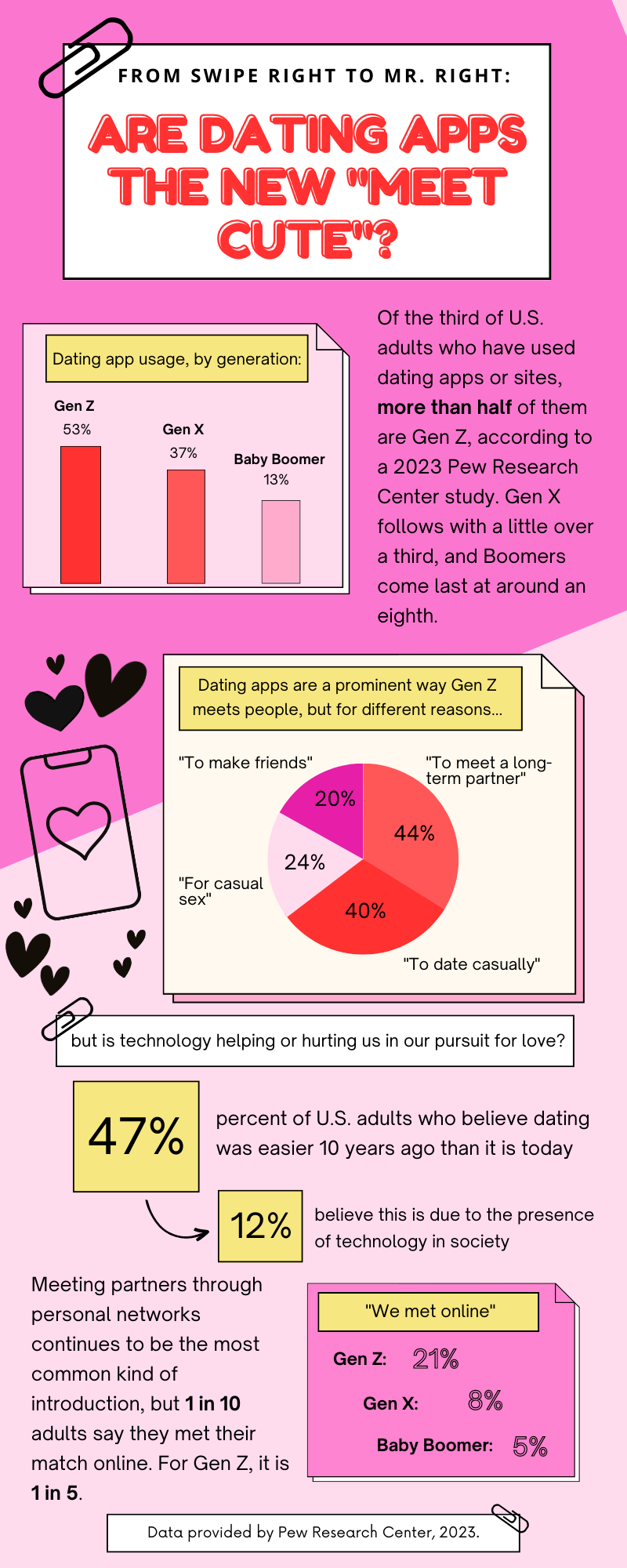
Click for bigger version
AI, Algorithms, and Virtual Reality
For all of its vices, online dating still stands strong as a better option for people now as opposed to the more traditional in-person ways of the past. Part of the reason Liesel is confident in the future of dating apps and similar technologies is the positive impact algorithms are having on curating matches by narrowing down the pool based on how a user is swiping.
“I think that as AI gets better, those recommendations are also going to get better,” she said.
"Overall when I look at the future I'm optimistic, but at the same time I think it’s introduced new problems that weren’t there before and it has amplified problems that already existed. So I think that there are a lot of issues that need to be addressed before we reach that point."
Liesel also spoke with excitement about the new developments within augmented and virtual reality in regard to meeting, communicating and connecting with people, which she sees as an opportunity to take some of this experience back to its face to face roots.
"When you are online dating oftentimes you are not in the same location as somebody else, and so having a way to interact with someone without having to physically be there feels more organic, that's what I think AR and VR could be really good for. You could walk up to someone in a virtual bar without actually having to get dressed.”

I regret to inform you that we've reached the end. Sadly, no more swiping (for now).
Time for a recap:
Baby Boomers met potential partners and romantic interests in person or through their personal network. Their circles were small and confined by location. They used home phones, phone booths, and in cases of long distance, letters to keep in touch.
Gen X still primarily met people in person at social events, school, and other community places, but they witnessed the glorious phone to pager pipeline. The breakthrough of pagers made it easier to contact people quicker and know who was calling, and you could even send secret "codes" on them(how vintage!).
Alas, we are back to the present: Gen Z, whose dating lives are evidently are driven by meeting people online through social media or on dating apps. They communicate through these social media platforms or through their smartphones exclusively (perhaps a bit antisocial if you ask me).
Now, into the future, which apparently has the potential bring cult classic scifi fantasy to life through AI and virtual reality.
Imagine finding your soulmate in avatar form--sounds like an unorthodox meet cute to me!


